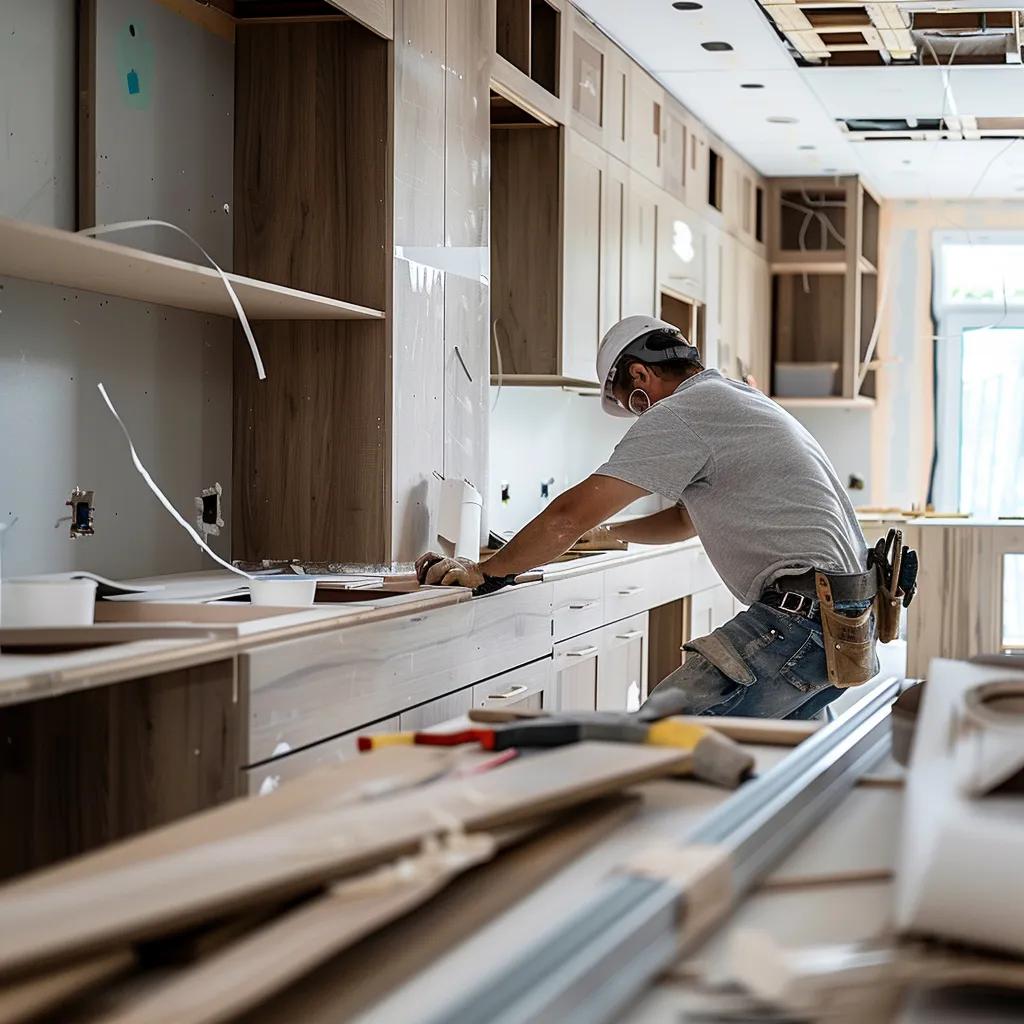Dreaming of a refreshed kitchen but uncertain about how long the process will take when comparing local contractors? Understanding how project timelines vary among different kitchen remodeling contractors in your area empowers Southwest Florida homeowners to plan effectively, allocate budgets, and avoid unexpected delays. This guide explains average remodel durations, breaks down key phases, highlights contractor-driven differences, identifies regional influencers, and offers strategies to expedite your renovation. Along the way, you’ll see how Schooner Bay Builders’ Remodeling Division supports predictable schedules and local expertise.
How Long Does a Typical Kitchen Remodel Take?
A typical kitchen remodel timeline defines the total duration from initial design to final inspection, driven by planning, permitting, construction, and finishing phases. Predictable schedules reduce stress and align contractor resources, ensuring on-time completion. For example, a mid-range remodel might span 10–16 weeks, while minor updates can finish in under two months.
What Are the Average Timelines for Small, Mid-Range, and Full Kitchen Remodels?
Below is a breakdown of common kitchen remodel scopes and their usual durations based on local contractor experience.
| Remodel Scope | Estimated Duration | Typical Range |
|---|---|---|
| Cosmetic Refresh | 4–6 weeks | 3–8 weeks |
| Mid-Range Remodel | 10–16 weeks | 8–20 weeks |
| Full Renovation | 12–24 weeks | 10–28 weeks |
Kitchen Remodeling Timeframes
The duration of a kitchen remodel can vary significantly based on the scope of the project, with minor updates potentially taking 4-6 weeks, mid-range remodels 10-16 weeks, and full renovations 12-24 weeks. These timelines are influenced by factors such as design, permitting, material lead times, and installation phases.
How Do Design and Planning Phases Affect Overall Remodel Duration?

Early design and planning phases define layout approvals, material selections, and budget alignment, directly impacting subsequent construction efficiency.
- Comprehensive design consultations ensure accurate measurements and reduce revision cycles.
- Detailed material specifications minimize lead-time overruns for cabinets, countertops, and fixtures.
- Finalized blueprints accelerate permitting reviews by local authorities.
Effective planning shortens downstream phases and paves the way for permitting and procurement.
What Is the Role of Permitting and Material Lead Times in Scheduling?
Permitting and lead times often determine project start dates and critical path elements.
- Local permit approval can require 2–4 weeks in Cape Coral’s building department.
- Cabinet fabrication and countertop templating commonly need 4–8 weeks.
- Appliance orders may incur additional 1–3 weeks if custom finishes are selected.
Aligning procurement windows with permit timelines anchors the schedule and avoids idle labor costs.
How Do Installation and Finishing Phases Influence Completion Dates?
Installation and finishing phases bring visible progress but demand precise coordination.
- Cabinet and countertop installation typically spans 1–2 weeks depending on scope.
- Flooring, backsplash, painting, and trim work each require 1–5 days in sequence.
- Final inspections, punch-list adjustments, and cleaning usually take 3–7 days.
Efficient trade scheduling and on-site management ensure the project reaches sign-off on time.
What Key Phases Make Up a Kitchen Remodeling Timeline?
A kitchen remodeling timeline encompasses five core phases: design, permitting, demolition, installation, and inspection, which together determine project duration and homeowner satisfaction.
What Happens During the Design and Planning Phase?
During design and planning, homeowners review layout options, material samples, and 3D renderings to finalize a functional kitchen concept. This phase establishes clear scope definitions, aligns on budget constraints, and produces construction documents essential for permitting. Thorough collaboration here reduces mid-project changes and accelerates contractor execution.
How Long Does Permitting and Material Procurement Usually Take?
Securing permits and ordering long-lead items typically consumes 3–10 weeks:
- Permit submittal and municipal review (2–4 weeks).
- Cabinet and countertop fabrication orders (4–8 weeks).
- Fixture and appliance procurement (1–3 weeks).
Coordinated scheduling between the permitting office and suppliers shrinks downtime and keeps trades active.
What Are the Typical Durations for Demolition and Rough-Ins?
emolition and rough-in work replace old systems and prepare infrastructure:
- Selective demolition and debris removal require 2–4 days.
- Plumbing, electrical, and HVAC rough-ins usually take 3–7 days total.
Completing rough-ins promptly enables inspection sign-offs that unlock the installation stage.
How Much Time Is Needed for Cabinet, Countertop, and Flooring Installation?

Finishes installation unfolds in stages:
- Cabinet setting and leveling: 3–5 days.
- Countertop templating and installation: 2–3 days.
- Flooring, backsplash tiling, and trim: 5–10 days.
Sequencing these activities seamlessly translates graphic plans into a functional kitchen environment.
What Does the Final Inspection and Touch-Up Phase Involve?
The final inspection phase includes code-compliance verification, punch-list resolution, deep cleaning, and client walkthroughs. Typically spanning 3–7 days, this ensures all elements meet expectations before project hand-off and warranty activation.
How Do Timelines Vary Among Different Local Kitchen Remodeling Contractors?
While average timelines set expectations, contractor-specific factors cause variations in scheduling and execution.
What Factors Cause Timeline Differences Between Contractors?
Variances in timeline management stem from:
- Team size and trade partnerships influencing daily output.
- Project management systems that coordinate overlapping tasks.
- Supplier relationships that expedite material deliveries.
- Communication protocols that minimize decision-making delays.
Streamlined processes support faster completion, while less structured approaches introduce buffer periods.
How Does Local Expertise Affect Project Scheduling and Permitting?
Contractors with deep Cape Coral experience navigate permit offices efficiently, anticipate weather-related interruptions, and leverage supplier networks to reduce lead times. Engaging a locally rooted team delivers realistic schedules and proactive timing adjustments based on regional insights. Explore our Kitchen Remodeling in Cape Coral offerings to see how area expertise streamlines remodels.
What Are Typical Contractor Scheduling Practices and Communication Methods?
Reliable contractors publish phased schedules, provide weekly progress updates, and use digital dashboards for real-time task tracking. Clear milestone definitions and contingency plans reinforce transparency and align client expectations with actual progress.
How Do Contractors Handle Unexpected Delays and Timeline Adjustments?
When delays occur—whether due to inspection hold-ups or shipment issues—effective remodelers reallocate crews, source alternative products, and adjust task sequences to preserve overall deadlines.
What Factors Most Influence Kitchen Remodel Timelines in My Area?
Southwest Florida projects face unique timeline influencers spanning logistics, regulation, and environment.
How Does Material Availability Impact Project Duration?
Local supply chain constraints can extend lead times for specialty cabinetry or imported countertops. Contractors mitigate this by stocking high-demand finishes and maintaining backup material options to prevent work stoppages.
What Role Does Design Complexity Play in Extending Timelines?
Custom layouts, curved islands, integrated appliances, and specialty finishes add design complexity that can add 2–4 weeks to procurement and installation phases. Simplified designs accelerate remodeling flow and reduce coordination overhead.
How Do Local Permitting Processes Affect Remodel Scheduling?
Cape Coral’s dedicated building division processes kitchen remodel permits in approximately 10–20 business days. Engaging a contractor familiar with their submittal checklist decreases review cycles and expedites approval. Check our location and reviews on Google Maps to confirm our permit-ready track record.
What External Factors Can Cause Delays in Kitchen Remodeling?
Weather events, seasonal inspection backlogs, and homeowner decision changes can each add 1–3 weeks if not proactively managed. Anticipating these external variables creates realistic timeline buffers.
Factors Affecting Remodel Timelines
Several factors influence kitchen remodel timelines, including material availability, design complexity, local permitting processes, and external events. Supply chain issues, intricate designs, and permitting delays can extend project durations, while weather and homeowner decisions can also cause delays.
How Can Homeowners Expedite Their Kitchen Remodeling Timeline?
Homeowners can accelerate remodels by optimizing preparation, selection, and collaboration strategies.
What Are the Benefits of Choosing an Expedited Remodeling Process?
Expedited remodels reduce disruption, lower interim living costs, and deliver quicker ROI. Fast-track processes often translate into competitive trade pricing and shorter project financing periods.
How Can Early Planning and Material Selection Speed Up Timelines?
Confirming layouts, colors, and fixtures before contract signing front-loads decision-making, eliminating mid-project hold-ups. Pre-ordering key components aligns fabrication and delivery windows with the construction start date.
What Contractor Practices Help Accelerate Kitchen Remodels?
Selecting remodelers with integrated project management systems, in-house trade teams, and dedicated procurement specialists ensures cohesive workflows and minimized wait times for inspections and materials.
Are There Trade-Offs Between Speed and Quality in Kitchen Remodeling?
While faster timelines can pressure craftsmanship, reputable contractors maintain quality by overlapping non-critical tasks, using premium materials, and enforcing strict quality checkpoints.
How Do Small Kitchen Remodel Timelines Compare to Full Renovations?
Project scope dictates complexity and, in turn, affects completion schedules.
What Is the Typical Duration for Minor Kitchen Updates?
Minor updates, such as new paint, hardware swaps, and minor fixture installs, typically complete in 4–6 weeks when trade availability aligns and no structural changes are required.
How Long Do Full Kitchen Renovations Usually Take?
Extensive renovations involving layout reconfiguration, new plumbing, electrical rerouting, and high-end finishes generally span 12–24 weeks from start to final inspection.
What Timeline Differences Should Homeowners Expect Between Remodel Types?
Core distinctions include permitting complexity, demolition scope, and installation sequencing. Minor refreshes leverage simpler permit processes and finish work, while full renovations require comprehensive planning and multi-trade coordination.
What Are Common Questions About Kitchen Remodeling Timelines?
Homeowners often wonder about realistic schedules, acceleration options, and potential delays when planning a kitchen remodel.
How Long Does a Kitchen Remodel Really Take?
A complete kitchen remodel in Southwest Florida usually takes 10–16 weeks from demolition through finishing, excluding design and permitting time.
Can a Kitchen Be Remodeled in 2 Weeks?
Rapid two-week remodels are possible for purely cosmetic updates without structural changes, provided materials are in stock and permit requirements are minimal.
What Causes Delays in Kitchen Remodeling Projects?
Delays often stem from permit reviews, material backorders, severe weather, and unplanned design changes that disrupt the planned sequence of work.
What Is the Fastest Way to Remodel a Kitchen?
The quickest remodels use standardized cabinet lines, pre-selected finish packages, and contractor-managed procurement to compress ordering lead times and overlap trade tasks.
How Do Contractor Schedules Affect My Remodel Timeline?
Contractor availability, trade sequencing, and planned downtime between phases directly determine the start dates and consecutive workdays that shape your overall project timeline.
Southwest Florida homeowners benefit from clear, realistic kitchen remodeling schedules when collaborating with a proven local contractor. Schooner Bay Builders combines regional permitting expertise, structured project management, and trusted supplier relationships to deliver reliable timelines and outstanding craftsmanship. Explore our process on our Remodeling Division page or view project highlights on our YouTube channel to plan your next kitchen renovation with confidence.
- Kitchen Cabinet Pricing in Southwest Florida: What Stock, Semi-Custom, and Custom Really Cost — and What You’re Actually Paying For - February 23, 2026
- How Southwest Florida’s Climate Should Shape Your Kitchen Remodeling Material Choices - February 2, 2026
- Building a Home That Holds Up in Southwest Florida: What Hurricane-Resistant Construction Really Means - January 30, 2026
